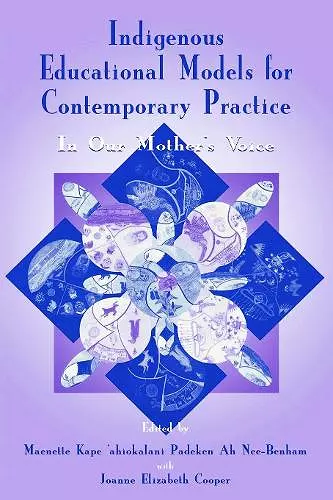Indigenous Educational Models for Contemporary Practice
In Our Mother's Voice
Maenette KP A Benham editor Joanne Elizabet Cooper editor
Format:Paperback
Publisher:Taylor & Francis Inc
Currently unavailable, and unfortunately no date known when it will be back
This paperback is available in another edition too:
- Hardback£145.00was £145.00(9780805834611)

What is the philosophy that should drive native education policy and practice? In July 1997 a group of native educational leaders from the United States (including Alaska and Hawai'i), Canada, Australia, and New Zealand gathered to define a potential solution to this question. This book passes on the individual educational philosophies of the participants and captures the essence of each in a dynamic, transformational, and holistic model--"Go to the Source"--which forwards a collective vision for a native language- and culture-based educational philosophy that native educational leaders and teachers, policymakers, and curriculum developers can use to ground their work. For more information visit http://ed-web2.educ.msu.edu/voice/
"The book and the In Our Mother's Voice Web site are recommended for educators, legislators, and students of Native populations."
—CHOICE
"The book holds great promise as a tool to help various First Nations frame and give voice to their perspectives on education and to engage in the construction of an Indigenous educational policy and practice. Refreshing about the book is its representation of models using real-life artifacts that were constructed by participants to assist them in telling their individual and tribal stories of education."
—The Alberta Journal of Educational Research
"As is customary is most Iroquois gatherings, the words that come before all else are those of giving thanks for the all the gifts of life....so it is with the same spirit that I begin the Foreword for this book....The initial goal was to gather indigenous educational leaders together for a forum focused on sharing knowledge and best practices for the native children from various indigenous groups from throughout the world....Like many of our ancestors were in their lifetimes, the educators at this gathering represented the ones who assumed their responsibilities to care for the next seven generations. They are the ones who, throughout their lives, have fought the tough battles to perpetuate traditional native knowledge and to develop education that develops indigenous youth into whole human beings....I believe this compilation of their collective wisdom about creating meaningful knowledge will make a difference....Through this book, we hope that we will leave even better paths to education for the generations yet to come."
—Valorie Johnson
From the "Foreword"
"Indigenous Educational Models for Contemporary Practice: In Our Mother's Voice gives meaning to Article 15 of the United Nation's Draft Declaration of Indigenous People's Rights. The Declaration proclaims, 'Indigenous children have the right to all levels and forms of education of the State. All indigenous peoples also have this right and the right to establish and control their educational systems and institutions providing education in their own languages, in a manner appropriate to their cultural methods of teaching and learning.' The legacy of colonialism and genocide has made it difficult to fulfill this right. Many educational traditions and practices have been lost or only remain in the memories of survivors of the indigenous people's holocaust. This book restores this educational legacy and adapts it to the reality of the global economy and culture. Further, it does more than recapture a lost past. The educational models included in this volume affirm the vitality of these traditions and their adaptability to contemporary times....It is my hope that the educational models described in this book will help put students, teachers, and the world on the path to harmony and hope."
—Joel Spring
From the "Note From the Editor of the Series"
"The purpose of this book is to create a space for the sharing of conversations and for the learning of both truth and wisdom through the ideas of fourteen Native educators from around the globe....Here, these remarkable teachers explore ways to enhance and apply a broader, more inclusive body of knowledge that links the 'best thinking' (theory and inquiry) on Native education with the 'best practices' (leadership, teaching, and learning) across diverse, Native communities. What we learn from these leaders is that our thinking and our work must be community-based and must facilitate the connection of schools, families, and children as we work across cultures to improve Native education. In addition, we learn that we must fashion a comprehensive curriculum that serves the academic, cultural, spiritual, and physical needs of Native children and youth. Finally, the learning experiences in this curriculum must be rooted in social action, which seeks to transform our current educational system, one that has for so long silenced Native peoples. This book begins the work of breaking that silence."
—Maenette Kape'ahiokalani Padekene Benham
From the Preface
ISBN: 9780805834628
Dimensions: unknown
Weight: 430g
226 pages